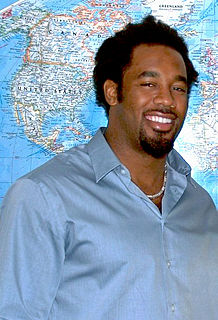A Quote by Erwin McManus
The more isolated and disconnected we are, the more shattered and distorted our self-identity. We are not healthy when we are alone. We find ourselves when we connect to others. Without community we don't know who we are... When we live outside of healthy community, we not only lose others. We lose ourselves...Who we understand ourselves to be is dramatically affected for better or worse by those we hold closest to us.
Related Quotes
It is difficult to see ourselves as we are. Sometimes we are fortunate enough to have good friends, lovers or others who will do us the good service of telling us the truth about ourselves. When we don't, we can so easily delude ourselves, lose a sense of truth about ourselves, and our conscience loses power and purpose. Mostly, we tell ourselves what we would like to hear. We lose our way.
Community cannot take root in a divided life. Long before community assumes external shape and form, it must be present as seed in the undivided self: only as we are in communion with ourselves can we find community with others. Community is an outward and visible sign of an inward and invisible grace, the flowing of personal identity and integrity into the world of relationships.
Our Christian destiny is, in fact, a great one: but we cannot achieve greatness unless we lose all interest in being great. For our own idea of greatness is illusory, and if we pay too much attention to it we will be lured out of the peace and stability of the being God gave us, and seek to live in a myth we have created for ourselves. And when we are truly ourselves we lose most of the futile self-consciousness that keeps us constantly comparing ourselves with others in order to see how big we are.
To see ourselves as others see us can be eye-opening. To see others as sharing a nature with ourselves is the merest decency. But it is from the far more difficult achievement of seeing ourselves amongst others, as a local example of the forms human life has locally taken, a case among cases, a world among worlds, that the largeness of mind, without which objectivity is self-congratulation and tolerance a sham, comes.
[Grace] is given not to make us something other than ourselves but to make us radically ourselves. Grace is given not to implant in us a foreign wisdom but to make us alive to the wisdom that was born with us in our mother?s womb. Grace is given not to lead us into another identity but to reconnect us to the beauty of our deepest identity. And grace is given not that we might find some exterior source of strength but that we might be established again in the deep inner security of our being and in learning to lose ourselves in love for one another to truly find ourselves.
The more we have given to ourselves, the more we have to give to others. When we find that place within ourselves that is giving, we begin to create an outward flow. Giving to others comes not from a sense of sacrifice, self-righteousness, or spirituality, but for the pure pleasure of it, because it's fun. Giving can only come from a full, loving space.
The remarkable thing is that we really love our neighbor as ourselves: we do unto others as we do unto ourselves. We hate others when we hate ourselves. We are tolerant toward others when we tolerate ourselves. We forgive others when we forgive ourselves. We are prone to sacrifice others when we are ready to sacrifice ourselves.
The Savior taught His disciples, 'For whosoever will save his life shall lose it: but whosoever will lose his life for my sake, the same shall save it' (Luke 9:24)."I believe the Savior is telling us that unless we lose ourselves in service to others, there is little purpose to our own lives. Those who live only for themselves eventually shrivel up and figuratively lose their lives, while those who lose themselves in service to others grow and flourish—and in effect save their lives.
Energy-fire experiences take us into ourselves only that we might reach outside of ourselves. Metanoia is a de-centering experience of connected-ness and community. It is not an exercise in reciting what Jesus has done for me lately. Energy-fire ecstasy, more a buzz than a binge, takes us out of ourselves, literally. That is the meaning of the word 'ecstatic.'
Each one of us needs time and space for recollection, meditation and calmness.... Thanks be to God that this is so! In fact, this need tells us that we are not made for work alone, but also to think, to reflect or even simply to follow with our minds and our hearts a tale, a story in which to immerse ourselves, in a certain sense to lose ourselves to find ourselves subsequently enriched.


































